 W
WThe presidency of Ulysses S. Grant began on March 4, 1869, when Ulysses S. Grant was inaugurated as the 18th president of the United States, and ended on March 4, 1877. Grant took office in the aftermath of the Civil War, and he presided over much of the Reconstruction Era. A Republican, Grant became president after defeating Democrat Horatio Seymour in the 1868 presidential election. He was reelected in 1872 in a landslide victory, overcoming a split in the Republican Party that resulted in the formation of the Liberal Republicans, which nominated Horace Greeley to oppose him. He was succeeded as president by Republican Rutherford B. Hayes after the contested 1876 presidential election.
 W
WThe Fifteenth Amendment to the United States Constitution prohibits the federal government and each state from denying a citizen the right to vote based on that citizen's "race, color, or previous condition of servitude." It was ratified on February 3, 1870, as the third and last of the Reconstruction Amendments.
 W
WThe 1872 United States presidential election was the 22nd quadrennial presidential election, held on Tuesday, November 5, 1872. Despite a split in the Republican Party, incumbent President Ulysses S. Grant defeated Liberal Republican nominee Horace Greeley. The election is notable for being the only presidential election in which a major party nominee died during the election process.
 W
WThe 1876 South Carolina gubernatorial election was held on November 7, 1876 to select the governor of the state of South Carolina. The election campaign was a referendum on the Radical Republican-led state government and their Reconstruction policies. Opponents disputed the challenger Wade Hampton III's victory, gained by a margin of little more than 1100 votes statewide. But he took office in April 1877, after President Hayes withdrew federal troops as a result of a national Democratic compromise, and the incumbent Daniel Henry Chamberlain left the state.
 W
WThe annexation of Santo Domingo was an attempted treaty during the later Reconstruction Era, initiated by United States President Ulysses S. Grant in 1869, to annex "Santo Domingo" as a United States territory, with the promise of eventual statehood. President Grant feared some European power would take the island in violation of the Monroe Doctrine. He privately thought annexation would be a safety valve for African Americans who were suffering persecution in the US, but he did not include this in his official messages. Grant speculated that the acquisition of Santo Domingo would help bring about the end of slavery in Cuba and elsewhere.
 W
WThe Brooks–Baxter War was an armed conflict in Little Rock and New Gascony, Arkansas, in the United States, in 1874 between factions of the Republican Party over the disputed 1872 state gubernatorial election. The victor in the end was the "Minstrel" faction led by Elisha Baxter over the "Brindle Tail" faction led by Joseph Brooks.
 W
WThe Civil Rights Act of 1875 sometimes called the Enforcement Act or the Force Act, was a United States federal law enacted during the Reconstruction era in response to civil rights violations against African Americans. The bill was passed by the 43rd United States Congress and signed into law by United States President Ulysses S. Grant on March 1, 1875.
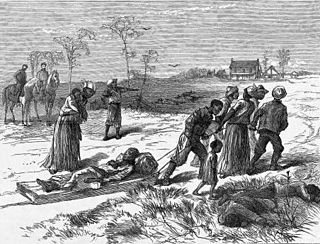 W
WThe Colfax massacre, sometimes referred to by the euphemism Colfax riot, occurred on Easter Sunday, April 13, 1873, in Colfax, Louisiana, the seat of Grant Parish, where an estimated 62-153 black men were murdered by white Southerners who had formed a militia. Three white men died in the confrontation, with at least one said to have been shot by his own ally.
 W
WThe Comstock Laws were a set of federal acts passed by the United States Congress under the Grant administration along with related state laws. The "parent" act was passed on March 3, 1873, as the Act for the "Suppression of Trade in, and Circulation of, Obscene Literature and Articles of Immoral Use". This Act criminalized usage of the U.S. Postal Service to send any of the following items:obscenity contraceptives abortifacients sex toys personal letters with any sexual content or information or any information regarding the above items.
 W
WThe Enforcement Act of 1870, also known as the Civil Rights Act of 1870 or First Ku Klux Klan Act, or Force Act was a United States federal law that empowered the President to enforce the first section of the Fifteenth Amendment throughout the United States. The act was the first of three Enforcement Acts passed by the United States Congress in 1870 and 1871, during the Reconstruction Era, to combat attacks on the voting rights of African Americans from state officials or violent groups like the Ku Klux Klan.
 W
WGrantism is a derisive term of United States origin referring to the political incompetence, corruption, and fraud, during the administration of President Ulysses S. Grant. His Presidency, from 1869 to 1877, was marred by many scandals and fraudulent activities associated with persons within his administration, including his cabinet, which was in continual transition, divided by the forces of political corruption and reform. Among them were: Black Friday, corruption in the Department of the Interior, the Sanborn incident, and the Whiskey Ring.
 W
WThe Great Sioux War of 1876, also known as the Black Hills War, was a series of battles and negotiations which occurred in 1876 and 1877 between the Lakota Sioux, Northern Cheyenne, and the United States. The cause of the war was the desire of the U.S. government to obtain ownership of the Black Hills. Gold had been discovered in the Black Hills, settlers began to encroach onto Native American lands, and the Sioux and Cheyenne refused to cede ownership to the U.S. Traditionally, the United States military and historians place the Lakota at the center of the story, especially given their numbers, but some Native Americans believe the Cheyenne were the primary target of the U.S. campaign.
 W
WThe history of U.S. foreign policy from 1861 to 1897 concerns the foreign policy of the United States during the presidential administrations of Abraham Lincoln, Andrew Johnson, Ulysses S. Grant, Rutherford B. Hayes, James A. Garfield, Chester A. Arthur, Grover Cleveland, and Benjamin Harrison. The period began with the outbreak of the American Civil War 1861 and ended with the 1897 inauguration of William McKinley, whose administration commenced a new period of U.S. foreign policy.
 W
WThe first inauguration of Ulysses S. Grant as the 18th President of the United States took place on March 4, 1869, at the East Portico of the United States Capitol in Washington, D.C. This was the 21st inauguration and marked the commencement of the first four-year term of Ulysses S. Grant as President and the only term of Schuyler Colfax as Vice President. Chief Justice Salmon P. Chase administered the presidential oath of office. Outgoing president Andrew Johnson did not attend the inaugural ceremonies, as President-elect Grant refused to sit with him in the carriage going to it. Instead, he was in the White House signing last-minute legislation.
 W
WThe second inauguration of Ulysses S. Grant as President of the United States was held on Tuesday, March 4, 1873, at the East Portico of the United States Capitol in Washington, D.C. This was the 22nd inauguration and marked the commencement of the second and final four-year term of Ulysses S. Grant as President and the only term of Henry Wilson as Vice President. Chief Justice Salmon P. Chase administered the presidential oath of office. This was one of the coldest inaugurations in U.S. history with 16 degrees Fahrenheit at noon, and the inaugural ball ended early when the food froze. Wilson died 2 years, 263 days into this term, and the office remained vacant since there was no constitutional provision which allow an intra-term vice-presidential office filling; it would be regulated by the Twenty-fifth Amendment in 1967.
 W
WFollowing is a list of all Article III United States federal judges appointed by President Ulysses S. Grant during his presidency. In total Grant appointed 46 Article III federal judges, making him the first President to appoint more federal judges than George Washington. Grant's appointments included 4 Justices to the Supreme Court of the United States, 10 judges to the United States circuit courts, and 32 judges to the United States district courts. Grant also appointed Edwin M. Stanton to the Supreme Court in 1869; Stanton was confirmed and his commission was issued, but died before he could accept his commission and take his seat.
 W
WThe Ku Klux Klan, commonly shortened to the KKK or the Klan, is an American white supremacist hate group whose primary targets are African Americans, as well as Jews, immigrants, leftists, homosexuals, and Catholics. The Klan has existed in three distinct eras at different points in time during the history of the United States. Each has advocated extremist reactionary positions such as white nationalism, anti-immigration and – especially in later iterations – Nordicism, antisemitism, prohibition, right-wing populism, anti-communism, homophobia, Islamophobia, anti-atheism, and anti-Catholicism. Historically, the first Klan used terrorism – both physical assault and murder – against politically active blacks and their allies in the South in the late 1860s, until it was suppressed around 1872. All three movements have called for the "purification" of American society and all are considered "right-wing extremist" organizations. In each era, membership was secret and estimates of the total were highly exaggerated by both friends and enemies.
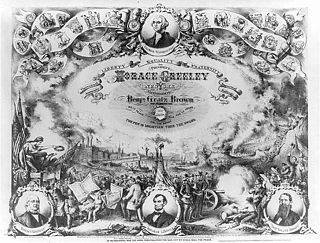 W
WThe Liberal Republican Party of the United States was an American political party that was organized in May 1872 to oppose the reelection of President Ulysses S. Grant and his Radical Republican supporters in the presidential election of 1872. The party emerged in Missouri under the leadership of Senator Carl Schurz and soon attracted other opponents of Grant. The party opposed Grant's Reconstruction policies and sought civil service reform. It lost in a landslide and disappeared after the 1872 election.
 W
WPresident Ulysses S. Grant sympathized with the plight of Native Americans and believed that the original occupants of the land were worthy of study. During the 19th Century, the term "Indian" was used to describe Native peoples of America. Grant's Inauguration Address set the tone for the Grant administration Native American Peace policy. The Board of Indian Commissioners was created to make reforms in Native policy and to ensure Native tribes received federal help. Grant lobbied the United States Congress to ensure that Native peoples would receive adequate funding. The hallmark of the Grant's Peace policy was the incorporation of religious groups that served on Native agencies, which were dispersed throughout the United States.
 W
WThe Naturalization Act of 1870 was a United States federal law that created a system of controls for the naturalization process and penalties for fraudulent practices. It is also noted for extending the naturalization process to "aliens of African nativity and to persons of African descent" while also revoking the citizenship of naturalized Chinese Americans.
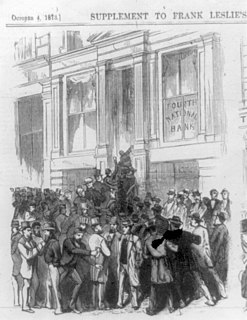 W
WThe Panic of 1873 was a financial crisis that triggered an economic depression in Europe and North America that lasted from 1873 to 1877 or 1879 in France and in Britain. In Britain, the Panic started two decades of stagnation known as the "Long Depression" that weakened the country's economic leadership. In the United States, the Panic was known as the "Great Depression" until the events of 1929 and the early 1930s set a new standard.
 W
WThe Reconstruction era was the period in American history that lasted from 1863 to 1877 following the American Civil War (1861–65) and is a significant chapter in the history of American civil rights. Reconstruction ended the remnants of Confederate secession and abolished slavery, making the newly freed slaves citizens with civil rights ostensibly guaranteed by three new constitutional amendments. Reconstruction also refers to the attempt to transform the 11 Southern former Confederate states, as directed by Congress, and the role of the Union states in that transformation.
 W
WThe Red River War was a military campaign launched by the United States Army in 1874 to displace the Comanche, Kiowa, Southern Cheyenne, and Arapaho Native American tribes from the Southern Plains, and forcibly relocate the tribes to reservations in Indian Territory. Lasting only a few months, the war had several army columns crisscross the Texas Panhandle in an effort to locate, harass, and capture highly mobile Native American bands. Most of the engagements were small skirmishes in which neither side suffered many casualties. The war wound down over the last few months of 1874, as fewer and fewer Indian bands had the strength and supplies to remain in the field. Though the last significantly sized group did not surrender until mid-1875, the war marked the end of free-roaming Indian populations on the southern Great Plains.
 W
WDuring Ulysses S. Grant's two terms as President of the United States (1869–1877) there were several executive branch investigations, prosecutions, and reforms carried-out by President Grant, Congress, and several members of his Cabinet, in the wake of several revelation of fraudulent activities within the administration. Grant's cabinet fluctuated between talented individuals or reformers and those involved with political patronage or party corruption. Some notable reforming cabinet members were persons who had outstanding abilities and made many positive contributions to the administration. These reformers resisted the Republican Party's demands for patronage to select efficient civil servants.
 W
WUlysses S. Grant and his administration, including his cabinet, suffered many scandals, leading to continuous reshuffling of officials. Ulysses S. Grant, ever trusting of associates, was himself influenced by both forces. The standards in many of his appointments were low, and charges of corruption were widespread. Starting with the Black Friday (1869) gold speculation ring, corruption would be discovered in seven federal departments, including the Navy, Justice, War, Treasury, Interior, State, and the Post Office. Reform movements initiated in both the Democratic Party and the Liberal Republicans, a faction that split from Republican Party to oppose political patronage and corruption in the Grant administration. Nepotism was prevalent, with over 40 family members benefiting from government appointments and employment. The prevalent corruption was eventually called "Grantism." The Democratic Party, however was not free from scandal, when New York reformers broke the Tweed Ring in 1871.
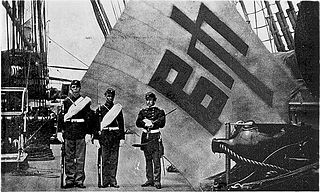 W
WThe United States expedition to Korea, known by the Koreans as the Shinmiyangyo or simply the Korean Expedition, in 1871, was the first American military action in Korea.
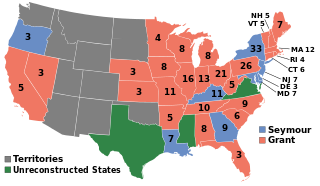 W
WThe 1868 United States presidential election was the 21st quadrennial presidential election, held on Tuesday, November 3, 1868. In the first election of the Reconstruction Era, Republican nominee Ulysses S. Grant defeated Horatio Seymour of the Democratic Party. It was the first presidential election to take place after the conclusion of the American Civil War and the abolition of slavery. It was the first election in which African Americans could vote in the reconstructed Southern states, in accordance with the First Reconstruction Act.
 W
WThe Virginius Affair was a diplomatic dispute that occurred from October 1873 to February 1875 between the United States, the United Kingdom, and Spain, during the Ten Years' War. Virginius was a fast American ship hired by Cuban insurrectionists to land men and munitions in Cuba to attack the Spanish regime there. It was captured by the Spanish, who wanted to try the men onboard as pirates and execute them. The Spanish executed 53 of the men but stopped when the British government intervened.
 W
WThe White League, also known as the White Man's League, was a white paramilitary terrorist organization started in the Southern United States in 1874 to intimidate freedmen from voting and politically organizing. Its first chapter was formed in Grant Parish, Louisiana, and neighboring parishes and was made up of many of the Confederate veterans who had participated in the Colfax massacre in April 1873. Chapters were soon founded in New Orleans and other areas of the state.